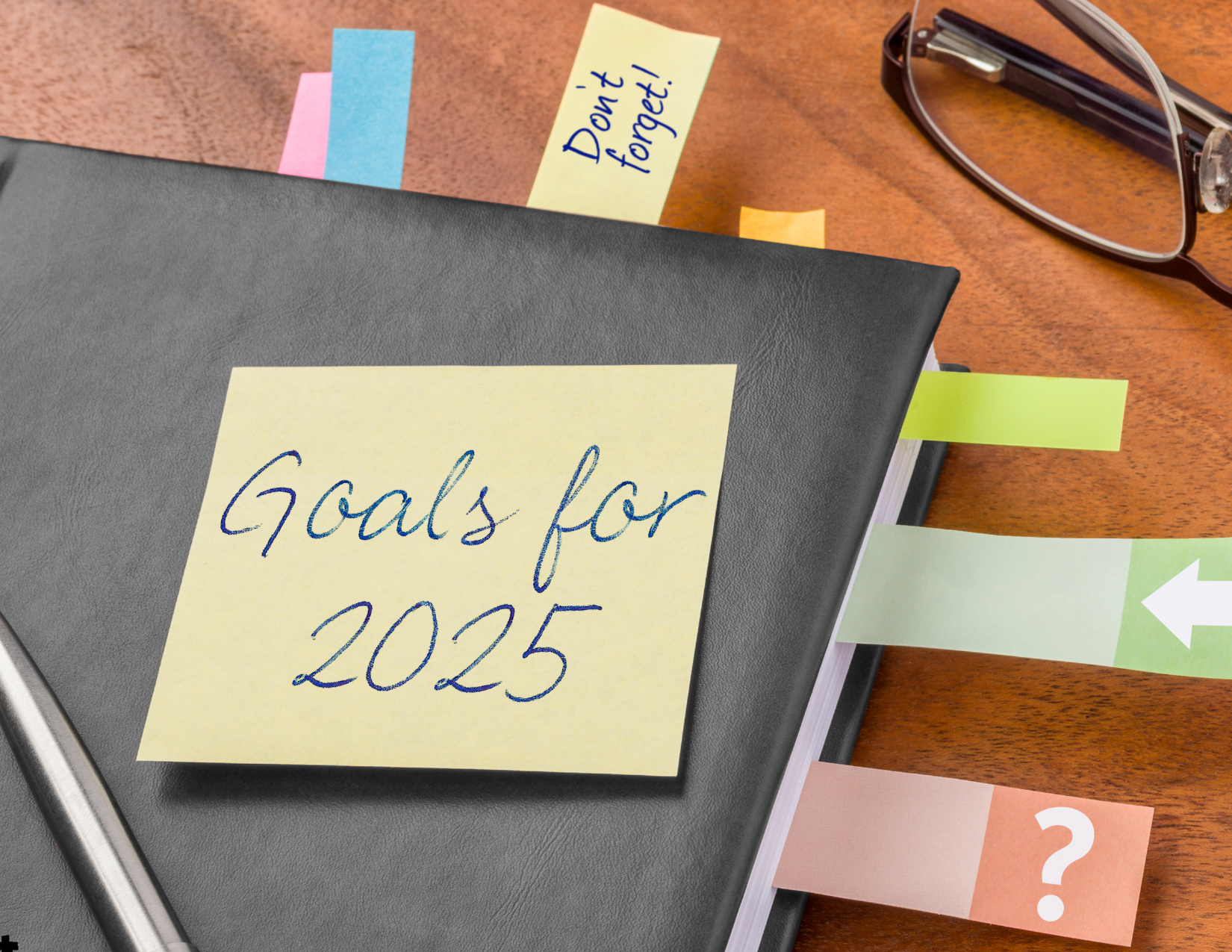
Helpful Goals for 2025: A Guide to a Healthier Mind
This post may contain affiliate links, which means we may receive a commission, at no extra cost to you, if you make a purchase through a link. Please see our full disclosure https://sagecounselingtherapyandwellness.com/disclosure-privacy-policy-terms-of-use/ for further information.
As we step into 2025, prioritizing mental health is more important than ever. According to the American Psychiatric Association, 33% of Americans are making mental health resolutions this year—a record high. Younger generations are leading the charge, with nearly half of 18-34-year-olds setting goals to improve their emotional well-being. Setting clear and achievable mental health goals can provide structure, motivation, and a sense of progress. Whether you’re looking to reduce anxiety, cultivate mindfulness, or simply feel more balanced, incorporating small, consistent habits can make a big impact. Here are five meaningful mental health goals to consider for 2025.
1. Start a Daily Gratitude Practice
Gratitude is a powerful tool for shifting focus toward positivity, fostering resilience, and promoting a more hopeful mindset. By writing down three things you’re grateful for daily, you can train your brain to recognize the good in your life, even during difficult times. Research has shown that practicing gratitude consistently can reduce stress, improve mood, and even rewire neural pathways for a more positive outlook.
Consider keeping a dedicated gratitude journal where you list moments, people, or experiences that bring you joy. This practice can be as simple as appreciating a beautiful sunset, a kind gesture from a stranger, or acknowledging personal achievements, no matter how small. Over time, these reflections accumulate, creating a way to look back at all of the positivity whenever you need a mental boost.
If writing isn’t your preference, try voicing your gratitude aloud during morning or evening reflections or sharing it with a friend or loved one. You can also express gratitude by letting someone know you appreciate them, sending a thoughtful note, or taking a moment to savor a happy experience. By making gratitude a daily habit, you develop emotional resilience, strengthen relationships, and promote a deeper appreciation for life’s blessings.
2. Create a Consistent Sleep Routine
Quality sleep is essential for both physical and mental well-being, yet many people struggle with inconsistent sleep patterns that leave them feeling drained, anxious, and unfocused. Poor sleep can worsen stress, decrease emotional regulation, and negatively impact cognitive function, making daily challenges feel overwhelming. Establishing a structured bedtime routine and a regular sleep schedule can significantly enhance mental clarity, emotional stability, and overall health.
To create a consistent sleep routine, aim to go to bed and wake up simultaneously each day, even on weekends. This helps regulate your body’s internal clock, making it easier to fall asleep and wake up naturally. Reduce screen exposure at least an hour before bed, as blue light from phones, tablets, and computers can interfere with melatonin production, the hormone responsible for sleep. Instead, develop relaxing pre-sleep habits, such as reading a book, journaling about your day, practicing deep breathing exercises, or engaging in a calming nighttime meditation.
Creating a comfortable sleep environment is also key—ensure your bedroom is calm, dark, and quiet, and invest in comfortable bedding that promotes relaxation. Avoid caffeine or heavy meals too close to bedtime, as they can disrupt sleep quality. By prioritizing a structured sleep schedule, you’ll experience better emotional regulation, improved concentration, increased energy levels, and greater resilience to stress throughout the day.
3. Practice Mindfulness and Deep Breathing
Mindfulness is the practice of being fully present in the moment, allowing you to observe thoughts and emotions without judgment. In today’s fast-paced world, many people operate on “autopilot,” going through their routines without truly experiencing the present moment. Cultivating mindfulness can help reduce anxiety, improve emotional regulation, and enhance overall well-being.
Scientific research, including studies supported by the National Institutes of Health (NIH), has shown that mindfulness can positively change brain regions related to memory, emotion, and learning. Pairing mindfulness with deep breathing exercises can further promote relaxation, decrease the body’s stress response, and build emotional resilience.
Incorporate mindfulness into your daily routine by engaging in activities that encourage being present, such as mindful walking, meditation, or savoring a meal without distractions. Even small moments, like the feeling of the sun on your skin or the sound of birds chirping, can cultivate greater awareness and appreciation.
Additionally, deep breathing exercises like the 4-7-8 technique (inhale for four seconds, hold for seven, exhale for eight) can help regulate emotions and lower anxiety levels. Consistently practicing mindfulness and breathwork can improve focus, emotional balance, and a greater sense of peace in daily life. Whether through guided meditation, yoga, or simply taking mindful pauses throughout the day, making mindfulness a habit can create a more grounded and fulfilling life.
4. Schedule Weekly “Unplugged” Time
Taking an extended break from digital devices each week is essential for mental clarity, focus, and emotional balance. The constant notifications, emails, and social media updates can contribute to information overload, stress, and difficulty maintaining presence in real-life interactions. Setting aside intentional time to unplug allows for deeper self-connection, relaxation, and meaningful engagement with the world around you.
Establish specific time frames for your digital detox to make this goal a reality. For example, designate a “tech-free Sunday” or commit to an evening each week when all devices are turned off. Use this time to engage in screen-free activities that bring you joy and relaxation—reading a book, practicing a hobby, journaling, exercising, or spending quality time with loved ones.
Unplugging before bed can be incredibly beneficial, as it reduces exposure to blue light, which can interfere with sleep quality. Instead of scrolling through social media before bed, opt for a calming bedtime routine, such as meditation or stretching. By scheduling weekly unplugged time, you’ll experience increased creativity, enhanced mindfulness, and stronger real-world connections, leading to a healthier relationship with technology and a more balanced life.
5. Engage in Acts of Kindness Weekly
Acts of kindness benefit others and impact one’s own mental health. Research suggests that practicing empathy and generosity can increase happiness, reduce stress, and promote a greater sense of purpose. Giving to others—whether through time, words, or actions—releases endorphins, the brain’s “feel-good” chemicals, promoting emotional well-being.
Aim to complete at least one act of kindness each week. This can take many forms, from volunteering in your community, offering support to a friend, or simply sending a kind message to someone who might need it. Random acts of kindness, such as holding the door open for a stranger, offering a compliment, or paying for someone’s coffee, can create a ripple effect of positivity in your life and the lives of those around you.
Consider making a kindness challenge for yourself—write down different ways to give back each week. Some ideas include donating to a cause you believe in, mentoring someone, checking in on a loved one, or expressing appreciation to a coworker. Small gestures of kindness encourage deeper connections, cultivate gratitude, and contribute to a sense of community and belonging.
Mental health goals are extremely personal, but they all share a common purpose: cultivating a healthier, more balanced life. You can create lasting changes that support your emotional well-being by incorporating gratitude, mindfulness, better sleep habits, unplugged time, and acts of kindness into your routine. Remember, progress happens in small steps, and each effort you make is a step toward a healthier, happier you in 2025.
To discuss how therapy could help you during this season of your life, please contact me or schedule your free 15-minute consultation.
References:
American Psychiatric Association. (2024, December 18). More Americans making New Year’s mental health resolutions leading into 2025. Psychiatry.org – More Americans Making New Year’s Mental Health Resolutions Leading Into 2025. https://www.psychiatry.org/News-room/News-Releases/More-New-Years-Mental-Health-Resolutions
Claimont Health. (2025, January 7). Smart mental health goals for 2025. https://claimonthealth.co.uk/blog/smart-mental-health-goals-for-2025/
Culqui, E. (2025, January 3). Five mental health resolutions worth setting in 2025. PAR, Inc. Psychological Assessment Resources since 1978. https://www.parinc.com/learning-center/par-blog/detail/blog/2025/01/03/five-mental-health-resolutions-worth-setting-in-2025
Noor, S. (2024, June 17). Mindfulness matters. National Institutes of Health. https://newsinhealth.nih.gov/2012/01/mindfulness-matters
Wein, H. (Ed.). (2024, June 17). Mindfulness matters. National Institutes of Health. https://newsinhealth.nih.gov/2012/01/mindfulness-matters
Want to read more? Here are a few of my related blog posts you may be interested in checking out!





0 Comments